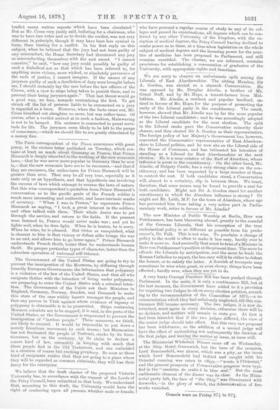The Paris correspondent of the Times announces with great pomp,
in the curious letter published on Tuesday, which con- tains at least as much about Germany as Franee, that Prince Bismarck is deeply absorbed in the working of the new economic laws,—that he was never more popular in Germany than he now is,--that the new economic laws are to be successes,—and that if they are successes, the enthusiasm for Prince Bismarck will be greater than ever. That may be all very true, especially as it rests only on an hypothesis, and that hypothesis one involving the success of laws which attempt to reverse the laws of nature. But this wise correspondent's quotation from Prince Bismarek's conversation as to the pacific grain of the French soldier is much more interesting and authentic, and bears intrinsic marks of accuracy. "When I was in France," he represents Prince Bismarck as saying, "I took a great interest in the soldiers, and often talked with them. Their whole desire was to get through the service, and return to the fields. If the peasant were listened to, France would never make war ; and yet he fights well, when he does fight. When he is beaten, he is sorry. When he wins, he is pleased. But victor or vanquished, what
• is clearest to him is that victory or defeat alike brings the war to an end, and allows him to go home again." Prince Bismarck understands French thrift, better than he understands human thrift. He gauges particular types of character, better than the colourless operation of universal sell-interest.


































 Previous page
Previous page